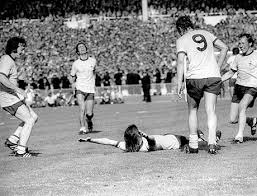By David Owen
Arsenal fans will be experiencing a surge of optimism after a highly encouraging – trophy-winning – end to the disjointed 2019-20 season under Mikel Arteta.
So it may be a mixed blessing that the new campaign will coincide with the 50th anniversary of the 1970-71 Double-winning season under manager Bertie Mee.
The Gunners had also collected silverware the previous spring, in the shape of the catchily-named 1970 Inter-Cities Fairs Cup, which they claimed with a 4-3 aggregate win over Anderlecht.
When the new league season got under way on August 15, however, there was little to anticipate the triumphant manner in which it would finish. Starting at Goodison, home of the reigning champions, the North Londoners were run ragged for 45 minutes by Everton’s ‘Holy Trinity’ of Howard Kendall, Colin Harvey and future Arsenal star Alan Ball, before recovering to salvage a 2-2 draw.
In doing so, they at least displayed the resilience that would become the hallmark of the team under the captaincy of centre-back Frank McLintock. But the comeback was not without cost: Charlie George, one of two young forwards who would leave their stamp on a glittering year, broke his ankle while scoring.
The next game, a local derby at Bobby Moore’s West Ham, was even more anti-climactic. A goalless draw yielded so little penetrative football that the brilliance of the new Upton Park floodlights became the main talking-point.
“This match really was the height of negation in terms of creative football,” thundered Geoffrey Green in The Times. For Laurie Pignon of the Daily Sketch, “the players rushed around as if they were being chased by angry wasps”.
Once they got back to Highbury, though, form picked up, and Mee’s men were lying third in the table as they travelled north on September 26 for a clash with Tony Waddington’s Stoke City.
On a famous night at the Victoria Ground, the visitors were spanked 5-0, Terry Conroy contributing one of the goals of the season.
In retrospect, the players may simply have been tired, with the same eleven having knocked a Lazio side, including Giorgio Chinaglia, out of Europe just three days earlier. A modern coach such as Arteta would have rotated. Then again, with George, Peter Simpson and the previous year’s Fairs Cup hero Jon Sammels all injured, Mee had few options.
The manager publicly heaped praise on Arsenal’s opponents, while the players rolled up their sleeves and got on with it. Their response explains much about how they ended up as champions.
Just two days later, the same team once again stepped out for a League Cup replay against upwardly-mobile Ipswich Town, and won 4-0. The next weekend, Nottingham Forest were trounced with the same score-line.
The Gunners’ other young attacking prospect, the irrepressible Ray Kennedy, scored five over the two games. The Forest match marked the start of a 14-game unbeaten league run.
This formidable bounce-back-ability was demonstrated again in the new year, when a sequence of three straight away first-division defeats was followed by nine consecutive league wins, all but one with clean sheets.
Only the formidable Leeds team of Bremner, Giles, Hunter et al were now keeping pace. A knife-edge late-April showdown at Elland Road threatened to take the title to Yorkshire. A scrambled Jack Charlton winner triggered five minutes of Arsenal protests. “I’m convinced he was offside,” Gunners’ coach Don Howe told the Mirror. “I didn’t sense I was offside. I was facing the wrong way – just not in a position to tell,” the goal-scorer retorted.
That put Leeds a point clear, with one game left to Arsenal’s two. Once again, the Londoners’ tenacity won through, as they registered successive 1-0 wins over their early-season nemesis Stoke, whom they also dispatched in an FA Cup semi-final, and finally Spurs, their bitter local rivals. This ultimate “one-nil to the Arsenal” was enough to win the league by a solitary point.
It was no surprise when the team’s resilience was called upon one last time at Wembley, with brainy winger Steve Heighway slotting Liverpool ahead in extra time. A scrappy equaliser set the scene for Charlie George to book-end a famous Arsenal season by burying the winner into the corner of Ray Clemence’s goal.
The local Holloway kid’s flat-of-back, arms-outstretched celebration has been etched into Arsenal folklore ever since. We football-mad eleven-year-olds, meanwhile, spent the summer seeing if we could grow our hair as long as Charlie’s.
Contact the writer of this story at moc.l1751324004labto1751324004ofdlr1751324004owedi1751324004sni@n1751324004ewo.d1751324004ivad1751324004

